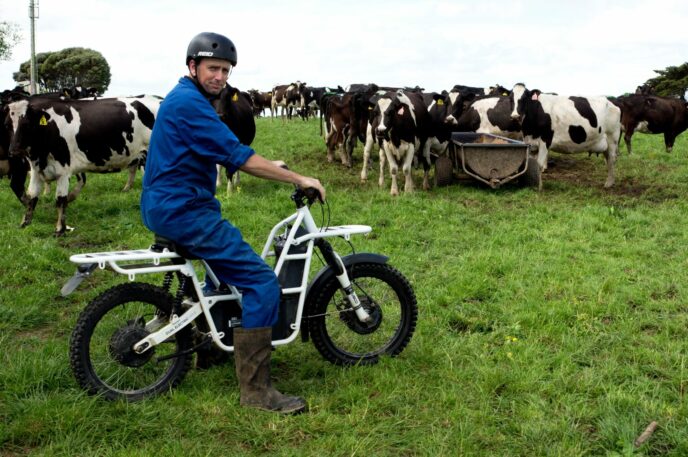
Tauranga-based UBCO is gearing up for widespread adoption of its utility electric bikes across New Zealand farms, businesses and households, thanks to funding from NZGIF investee Carbn Group. Read the article in EV Talk.
Carbn Group, with investment from New Zealand Green Investment Finance (NZGIF – aka the ‘Green Fund’), a crown-owned company accelerating low emissions investment in New Zealand, is partnering with UBCO to provide asset finance for a new subscription service model.
The partnership will fast-track UBCO chief executive Timothy Allan’s vision to have an UBCO electric utility vehicle on every farm in New Zealand, which represents a $1.4 billion per year opportunity for the global company.
UBCO’s plan to raise more than $25 million for global expansion – including its subscription model – featured in the Fullscreen Mode EVs and Beyond magazine.
“After introducing the subscription model to the urban environment with our partnership with Domino’s, it made sense to extend this to the agricultural sector which is where our business was built,” Allan says.
“This coincides with the introduction of the off-road 2×2 Work Bike and now with the backing of a finance partner that is dedicated to the transition away from carbon fuels, the offer makes sense for farms’ cashflow and planning.”
Instead of buying an EV outright, UBCO’s subscription model means businesses and consumers can pay a fixed monthly fee covering the bike, battery and servicing while UBCO retains ownership and stewardship of the product.
“Subscription means low upfront costs, and it includes servicing and maintenance so there are no unplanned costs,” Allan says.
“It’s basically a no hassle way of running a bike or a fleet of bikes. And the bikes are a more sustainable transport option, both during use and at the end of life.”
Almost half of UBCO sales historically have been from the agricultural sector.
Latest data shows there are about 51,000 farm holdings and 175,000 registered motorbikes in New Zealand, with the unregistered market operating primarily on farmland estimated at more than double that.
Based on New Zealand’s energy profile, the UBCO 2X2 has 80% less CO2 emissions than petrol vehicles and removes all particulate emissions during use.
Allan notes that the Carbn and Green Fund deal will help set the stage for large-scale farming operations committed to carbon reduction, such as the Government-owned Landcorp or Pāmu, to lead the way in sustainable practice.
“An UBCO on every farm in New Zealand would make a significant improvement to the carbon footprint and subscription opens the opportunity for wider spread ownership,” Allan adds.
One leading the sustainable farming transition is Waikato-based Grant Coombes, who has owned a fleet of UBCO 2X2s for five years on his 350-hectare farm. When it came time to upgrade to the new 2021 Work Bike model, moving to subscription was an easy choice for him.
“UBCO subscription means we can continue our journey to going green using these environmentally friendly, safe and easy to ride vehicles hassle free,” Coombes says.
“And the model gives us peace of mind the bikes and batteries will be disposed of safely at the end of their working life.
“With energy costs of under 20c a day it makes for efficient work, we’re only charging the bikes every three or four days. And now we can upgrade our fleet without paying the upfront costs – it’s a no-brainer.”
Allan says fleet subscription is a key part of its global business growth. Demand also comes from postal, freight and last-mile delivery sectors like food delivery.
Subscription is available for both the off-road 2×2 Work Bike and the road registrable 2X2 Adventure Bike.
UBCO operates in Australasia, Europe and the US where demand for low emissions transport is growing.
In New Zealand, the transport sector accounts for around 19% of greenhouse gas emission and where emissions have risen by more than 70% since 1990.
“There is no point doing a stellar job at reducing emissions and eliminating the use of fossil fuels if we don’t take responsibility to manage the product right through to its end of life,” says Allan.
“That means designing and making products to last, then putting systems in place to enable them to be reused and recycled when they are worn out.
“Our funding from Carbn Group to expand our vehicle subscription model is critical and comes at a time when interest in carbon emissions is at an all-time high.”
Read the full article on EV Talk.